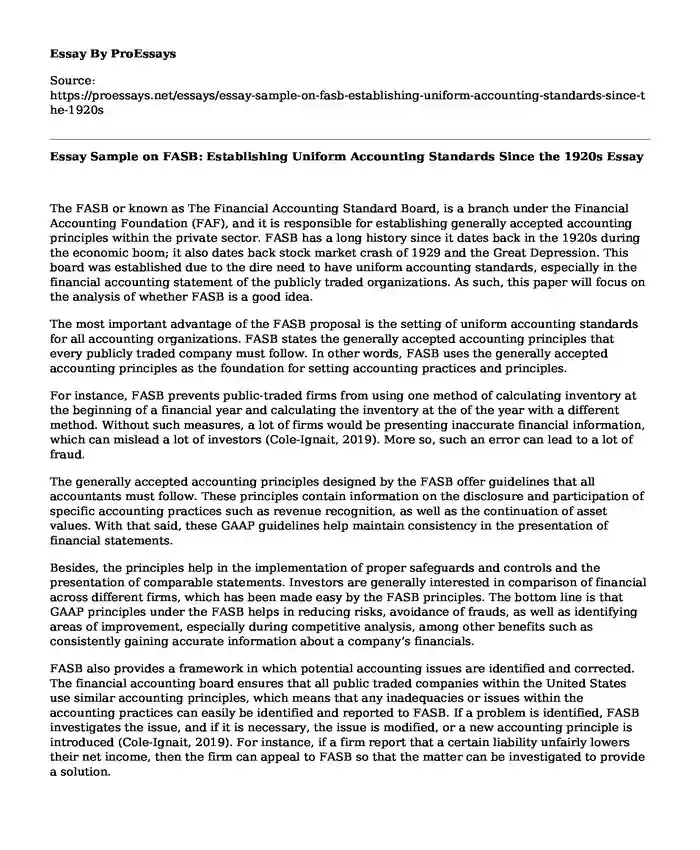The FASB or known as The Financial Accounting Standard Board, is a branch under the Financial Accounting Foundation (FAF), and it is responsible for establishing generally accepted accounting principles within the private sector. FASB has a long history since it dates back in the 1920s during the economic boom; it also dates back stock market crash of 1929 and the Great Depression. This board was established due to the dire need to have uniform accounting standards, especially in the financial accounting statement of the publicly traded organizations. As such, this paper will focus on the analysis of whether FASB is a good idea.
The most important advantage of the FASB proposal is the setting of uniform accounting standards for all accounting organizations. FASB states the generally accepted accounting principles that every publicly traded company must follow. In other words, FASB uses the generally accepted accounting principles as the foundation for setting accounting practices and principles.
For instance, FASB prevents public-traded firms from using one method of calculating inventory at the beginning of a financial year and calculating the inventory at the of the year with a different method. Without such measures, a lot of firms would be presenting inaccurate financial information, which can mislead a lot of investors (Cole-Ignait, 2019). More so, such an error can lead to a lot of fraud.
The generally accepted accounting principles designed by the FASB offer guidelines that all accountants must follow. These principles contain information on the disclosure and participation of specific accounting practices such as revenue recognition, as well as the continuation of asset values. With that said, these GAAP guidelines help maintain consistency in the presentation of financial statements.
Besides, the principles help in the implementation of proper safeguards and controls and the presentation of comparable statements. Investors are generally interested in comparison of financial across different firms, which has been made easy by the FASB principles. The bottom line is that GAAP principles under the FASB helps in reducing risks, avoidance of frauds, as well as identifying areas of improvement, especially during competitive analysis, among other benefits such as consistently gaining accurate information about a company’s financials.
FASB also provides a framework in which potential accounting issues are identified and corrected. The financial accounting board ensures that all public traded companies within the United States use similar accounting principles, which means that any inadequacies or issues within the accounting practices can easily be identified and reported to FASB. If a problem is identified, FASB investigates the issue, and if it is necessary, the issue is modified, or a new accounting principle is introduced (Cole-Ignait, 2019). For instance, if a firm report that a certain liability unfairly lowers their net income, then the firm can appeal to FASB so that the matter can be investigated to provide a solution.
Also, despite FASB being a private entity with no affiliation with the US government, the Securities and Exchange Commission (SEC) relies on FASB to set principles that have to be followed by all firms. SEC technically creates an oversight board to set accounting rules. However, appointing FASB within the board makes it easy to ease the burden on creating accounting rules. More so, FASB promotes internationally set standards. Globalization has made it easier for the FASB to connect with financial accounting markets across different nations. Ideally, FASB focuses on making financial reporting to be uniform globally by cooperating with the international accounting standard board.
SEC exercises oversight roles and ensures there is a necessary infrastructure to enforce FASB regulations. These oversight functions spread across all players in the financial markets, including the stockbrokers, money marketing funds, and listed public companies (Cole-Ignait, 2019). This move ensures that financial players stick to the principles set to prevent inside trading, and financial frauds, which prevent accounting malpractices.
FASB plays its roles by updating, establishing, clarifying, and publishing specific practices and broad principles that are acceptable in the private sector. Besides, government consolidation of subsidiaries, individual businesses, accounting, and industry associations among many other sources request findings from FASB on issues ranging from post-employment benefits to the consolidation of subsidiaries, which means that FASB is an all-round organization (Reference for Business n.d).
FASB is effective in its operations because it operates through research projects, public hearing, common letters, proposal drafts as well as discussion memoranda. The use of these measures makes FASB fair and successful in all its operations. The ultimate finding from these measures are published in the statement of financial accounting standards, and it is expected that every business should adhere to these standards. By the year 1999, there were 134 statements set by the FASB, and most of them have subsequently been superseded or amended (Reference for Business n.d). These statements act as the GAAP principles to guide all publicly traded companies. Despite all these benefits of FASB proposals, there are some challenges associated with FASB proposals. These challenges include understatement or overstatement of financial information because some FASB proposed principles are conservative. However, the advantages outweigh the disadvantages, which means FASB is effective for public traded companies to prevent fraud and presentation of the wrong financial information.
References
Cole-Ignait, P. (2019). Advantages & Disadvantages of FASB & SEC. AZ Central. https://yourbusiness.azcentral.com/advantages-disadvantages-fasb-sec-25195.htmlReference for Business. Financial Accounting Standards Board (FASB). https://www.referenceforbusiness.com/encyclopedia/Fa-For/Financial-Accounting-Standards-Board-FASB.html
Cite this page
Essay Sample on FASB: Establishing Uniform Accounting Standards Since the 1920s. (2023, Oct 25). Retrieved from https://proessays.net/essays/essay-sample-on-fasb-establishing-uniform-accounting-standards-since-the-1920s
If you are the original author of this essay and no longer wish to have it published on the ProEssays website, please click below to request its removal:
- UAE Banking Sector Overview
- Essay on Sales Taxation
- The Effect of International Financial Reporting Standards on Current Tax Planning Strategy
- Project Discussion on Federal Income Taxation Paper Example
- Under Armour: Financial Performance Overview - $7.92B Market Cap, Growing Debt - Essay Sample
- Essay Example on Differences Between Domestic and International Banks
- Essay Example on Bitcoin: A Digital Currency Revolution







